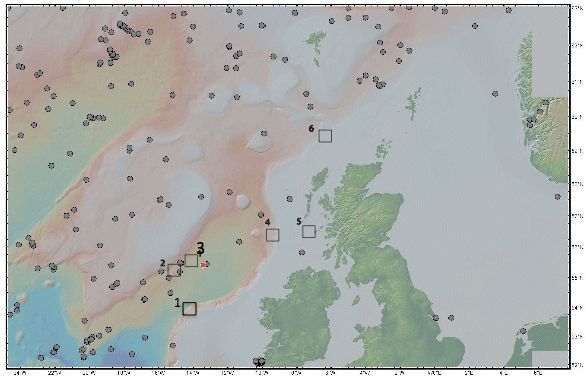MINGULAY ROCKALL
| Type | Oceanographic cruise |
|---|---|
| Ship | L'Atalante |
| Ship owner | Ifremer |
| Dates | 22/06/2016 - 04/07/2016 |
| Chief scientist(s) | ELLIOT Mary |
LABORATOIRE DE PLANÉTOLOGIE ET GÉODYNAMIQUE - UMR 6112 - NANTES Faculté des Sciences et Techniques, Bât. 4 2 rue de la Houssinière BP 92208 44322 Nantes Cedex 3 +33 (0)2 51 12 52 XX |
|
| DOI | 10.17600/16000800 |
| Objective | This project took advantage of transit time of the Atalante in the North Atlantic region. This project aimed to conduct multiproxy study (sedimentology, biology and geochemical measurements on fossil material) in order to reconstruct changes in reef/mound growth and associated changes in environmental conditions (ocean circulation, sea surface hydrology, temperature) during the Holocene period. Our study sites were located 1) offshore Scotland (Mingulay) and 2) on the Rockall Plateau (Logachev). Mingulay cold-water coral reef complex is located in the Sea of Hebrides off the West coast of Scotland were colonies of live L pertusa are found between 100-150m water depth. The Logachev reef is deeper, around 750m water depth, where colonies of L. pertusa and M. acculata can be found. We aim to reconstruct past changes in the hydrology of sub-surface and mid-depth waters with unprecedented temporal resolutions from 2 distinct water depths. This highl y novel project was conducted by experienced researchers all with international recognition. The sediment deposits have been sampled at each locality (gravity cores, multicores and kullenberg cores). Water samples were also collected at each locality. We will thus be able to extend the pre-existing records to the entire Holocene. Further to lengthening the pre-existing cores this cruise will provide additional fossil material that is required to conduct the multiproxy geochemical studies we aim to conduct. This international project brings together scientists from the UK, Ireland, Belgium and France and is set within a national research effort to study cold water coral ecosystems and paleoclimate reconstructions derived from this fossil material (ANR HAMOC PI C Colin - New Research Group funded by Region Pays de Loire PI M. Elliot). |

